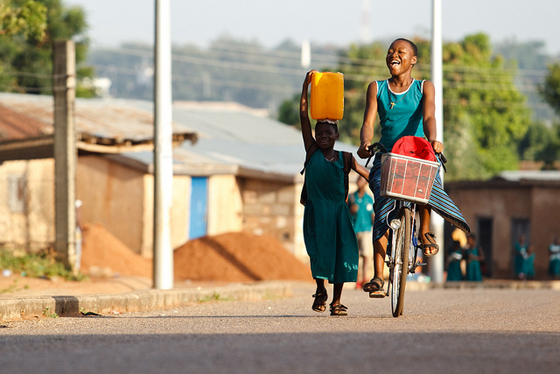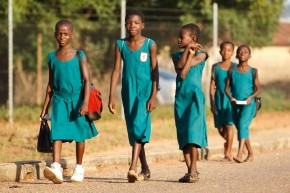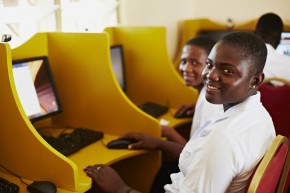"Out of seven children, I am the only one who went to school. I look and think differently from my siblings. I am able to make informed decisions and can never be cheated by any one. I am loved, respected and treated like a heroine in my family and my community. I couldn’t have done any better without education. Education for me is the key to eradicating poverty."
This is Adisah Alhassan speaking, a 25-year old who was identified by the NGO Camfed and supported throughout secondary school. Adisah went on to college, where she specialized in computer science and now has a diploma in software engineering. Adisah and her community members could not be more powerful representations of the "power of we" - the theme of Blog Action Day (see my colleague, Henry Donati's blog on elections in Ghana).

Since 1995, Camfed has supported 14,500 young women like Adisah to complete secondary school by providing scholarships. We all know that education can determine a woman’s ability to influence her own life – promoting economic independence and healthy behavior as well as delaying the time she decides to marry (see the 2012 World Development Report of Gender Equality and Development).
Last week – the International Day of the Girl's message of “my life, my right, end child marriage” brought this home. DFID Ghana’s Girls PASS programme also aims to ensure that each young woman can influence her own life. Girls PASS will do this by supporting 70,000 secondary school girls in the Northern Region of Ghana to receive the same scholarship opportunities as Adisah.
The Northern Region is one of the most deprived areas in Ghana. To give you a sense of the enormity of the development challenges – around 50% of the population live below the poverty line or to put it another way, over the past decade, while the number of poor has declined by 2.5 million in the south, it grew by 0.9 million in the 3 northern regions.
Over the next year, I will be blogging about our education programmes in Ghana, sharing stories of people like Adisah that we hope to help, and supporting Ghana to achieve secure middle income status. Not only are scholarship packages cost-effective interventions, investing in Adisah and other girls is smart economics for Ghana. The evidence confirms this approach. In a cross country study undertaken by economists, Cunningham and Chaaban they find that if, “girls receive secondary education, the additional growth would be equivalent to more than 25% of annual GDP in the African countries sampled or an increase in growth rates by one to 0.5 percentage points annually.”
While Adisah is fortunate, there are other girls who have not been. More than 65% of girls over 15 in Ghana’s Northern Region have received no formal education (compared with the national average of 21%). This is why our support continues to be pivotal to these communities. DFID Ghana will be working with communities in the north, Camfed and the Government of Ghana to ensure that these 70,000 girls remain in and complete secondary school through targeted incentives by 2016. The support includes school fees, uniforms (made by local tailors which helps provide the community with work), and school supplies.

Camfed will directly train the communities to monitor the scholarship programme using mobile phones. Community members will use interactive questionnaires downloaded on each phone to track scholarships, school achievements and community activities. Putting technology into the hands of the people themselves, and giving them responsibility for information that directly affects their lives, helps increase accountability and provides them with a vested stake in seeing their girls succeed.
The great part about Camfed’s model is that it doesn’t just end with girls like Adisah completing secondary school but extends beyond to communities. Adisah is now a CAMA– this is an alumni network of Camfed supported girls who receive skills training linked to employment opportunities to enable them to make the transition to a secure adulthood. Adisah has received management training and is now running an ICT centre, sponsored by Google in bringing Internet access and skills training to some of the most remote communities in rural Ghana.
Three hours from the nearest city with a high rate of HIV and AIDS, extreme poverty and little experience of technology, Camfed’s ICT centre run by Adisah and her three CAMA serve the community of Walewale. The Internet resource facility boasts a satellite and fast broadband connection as well as computers, printers, photocopier and digital cameras. Adisah and her other CAMA are the managers of the centre and are providing regular training sessions for the community on topics including emailing, Internet searching and using open office tools.
Adisah has every reason to be proud and explains: “I teach and support users of the centre mostly students and young women in basic computing such as operating systems, Microsoft Word, Excel, PowerPoint and the Internet. I also provide secretarial services such as typing, printing, making photocopies and scanning documents at the centre.”
The community recognizes the role that these CAMA play in promoting education for all. Christina Adongo, a student at Walewale Senior High agrees:

“This ICT centre is helping us a lot, we come here to do research for our studies so we can pass our exams, there are a lot of things we would not know if we did not have this centre, actually, it is helping us a lot.”
Future generations of girls see these CAMA creating and growing their own businesses as role models and see first hand the importance of continuing in secondary school.

12 comments
Comment by Megan posted on
Wonderful to see Camfed and DFID focus on continuity between finishing secondary and transitioning into a viable career and adulthood. Kudos!
Comment by Paud Murphy posted on
Great work, Nicole. It's so important to get girls staying in school as long as possible. CAMFED's work is one way and I hope we can persuade educators in Ghana to enroll young girls into school at the age of 5 or 6. Having six years of education before the onset of puberty can make all the difference to girls lives. Most will continue education, those that don't or can't will be literate and numerate and able to make better decisions and help their children better. Keep up the good work
Comment by Hellen posted on
Adisah is a role model to the community she leaves in .
This will encourage the Ghanaian girls to put much interest in school.
More appreciation goes to CAMFED who gave maximum support to Adisah.To educate a girl means you are educating the whole Nation.
Comment by raji saheed posted on
kudos! but i wonder why happenings in Ghana are always the reversal of whats going on in nigeria. both countries are like 6 & 9, in most instances
Comment by Hellen posted on
Much emphasis should be put on girl child Education, and it's the role of parents and community leaders to emphasis on the importance of Educating a girl child.
These girls would be future mothers and the first doctors at home so they should be sent to school for the well being of the Nation. Customary laws and traditions should be abolished to enable the young generation to prosper.
Comment by HERF Pakistan posted on
Wonderful efforts for the education of girls to make a big difference in the lives to make their own better decisions in the community for the social and ecomonic change.
Comment by Ebenezer Duncan-Williams posted on
Great effort, this shows that when Aid is used effectively, it works. Well done and keep up the good work.
Comment by Nicole Goldstein posted on
Thanks everyone for all your comments. I will hopefully be blogging more on girls' education interventions as they get underway, and as we work with the Government of Ghana and other partners in implementing the programmes.
Comment by Michael Stark posted on
This was very interesting, Nicole. I will email you.
Comment by HERF PAKISTAN posted on
We appriciate your great efforts for the promotion of girl's Education.
Comment by Huzeifa Yahaya posted on
this is so inspiring, great work for the education of rural girls in ghana. am very glad to see the impact this girls would have in respectful communities. well done for these great work
Comment by ubababs posted on
This is really very great indeed,it is truly enhancing an activity or program.These girls will now feel a great sense of belonging as compared to their male counterpart.